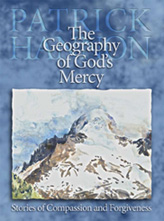Discussion QuestionsThe Geography of God's Mercy
Patrick Hannon is available to participate in small book discussion groups over the phone. To arrange a date and time, please contact Andrew Yankech at ACTA Publications at ayankech@actapublications.com or 847-676-2282.
Part One – A Dwelling in the Forest: The Silent Work of Mercy
Think of a time when you committed a trespass against another person and you had a choice whether or not to confess your guilt to that person, like Patrick Hannon did in "She Didn't Have to Say a Word." What went through your mind as you debated revealing your misdeed? If you did eventually confess, how did the other person respond? Did they forgive you? How did you feel after asking for forgiveness?
Part Two – The Deep Sea: The Power of Compassion
Sometimes things happen in our lives and we feel powerless to stop them, but we feel some level of responsibility regardless. Patrick Hannon experienced something like this in the story "All Over but the Cryin." Describe a time when you witnessed something similar but didn't or couldn't stop it. (It doesn't have to be so extreme. It could be something you saw on a train or at a sports game.) What emotions did it stir within you? Were you able to interact with the victim after the fact? Did you have someone with whom you could share your grief, like Patrick shared with his grandmother? If you could go back and relive the experience, is there anything you wish you could differently?
Part Three – The Desert Journey: The Cost of Mercy
Sometimes we can forgive everyone who has ever hurt us, but we cannot forgive ourselves. Like Sonia in "Coming Back Home," we may wonder if God can forgive our trespasses. Or perhaps, like Patrick Hannon in "My Brother's Keeper," we commit a sin that we cannot let go. We give offense and years later hold it inside even when the victim has forgiven and forgotten. Have you ever done anything in your life and had great difficulty forgiving yourself? How did you feel about yourself? If you have been able to overcome your guilt and forgive yourself, how do you feel about it now?
Part Four – A View from the Mountaintop: Seeing What God Sees
There are times in our lives when the journey is more important than the destination. What we learn on the way to the top of our mountain, the trials we encounter, are the "redemptive suffering" that Patrick Hannon refers to in "In the Dark." Have you experienced a time when the mountain top was only revealed to you because of the climb to the top? What was your realization, and how did the trials you encountered help you understand it? Do you think you are currently on such a journey?
Part Five – The Winding River: Healing Mercy
Can you think of a time when, "faced with the choice of playing the victim or standing with the victim," you chose the tougher course and became an advocate for the weak, the poor, the indigent? What did you have to sacrifice by making this decision? Was it worth it?
Part Six – The Wind-Swept Plains: Mercy in Plain View
In "One Hundred and Three Steps," Patrick Hannon describes the unfailing love and mercy of his grandmother. Think of a time when you experienced such compassion from another person. Describe the event. What did you fear would happen leading up to their forgiveness? How did you feel when they forgave you? Alternatively, have you ever been the person extending unconditional love and compassion?
Part Seven – The Long and Lonesome Valley: Alone No More
In "The Territory of Mercy," Patrick Hannon visits the Territorial Prison to hear confession, offer absolution and celebrate Mass. Even in this "God-forsaken place," he encounters God's presence and mercy. In "The Tenderloin," he learns that "there is no place God will not go to find us" and that "the greatest expression of love is born of mercy." Describe what mercy and compassion mean to you. How have you lived the Christian responsibility to show compassion and forgiveness? In what ways can you do more?














Add comment